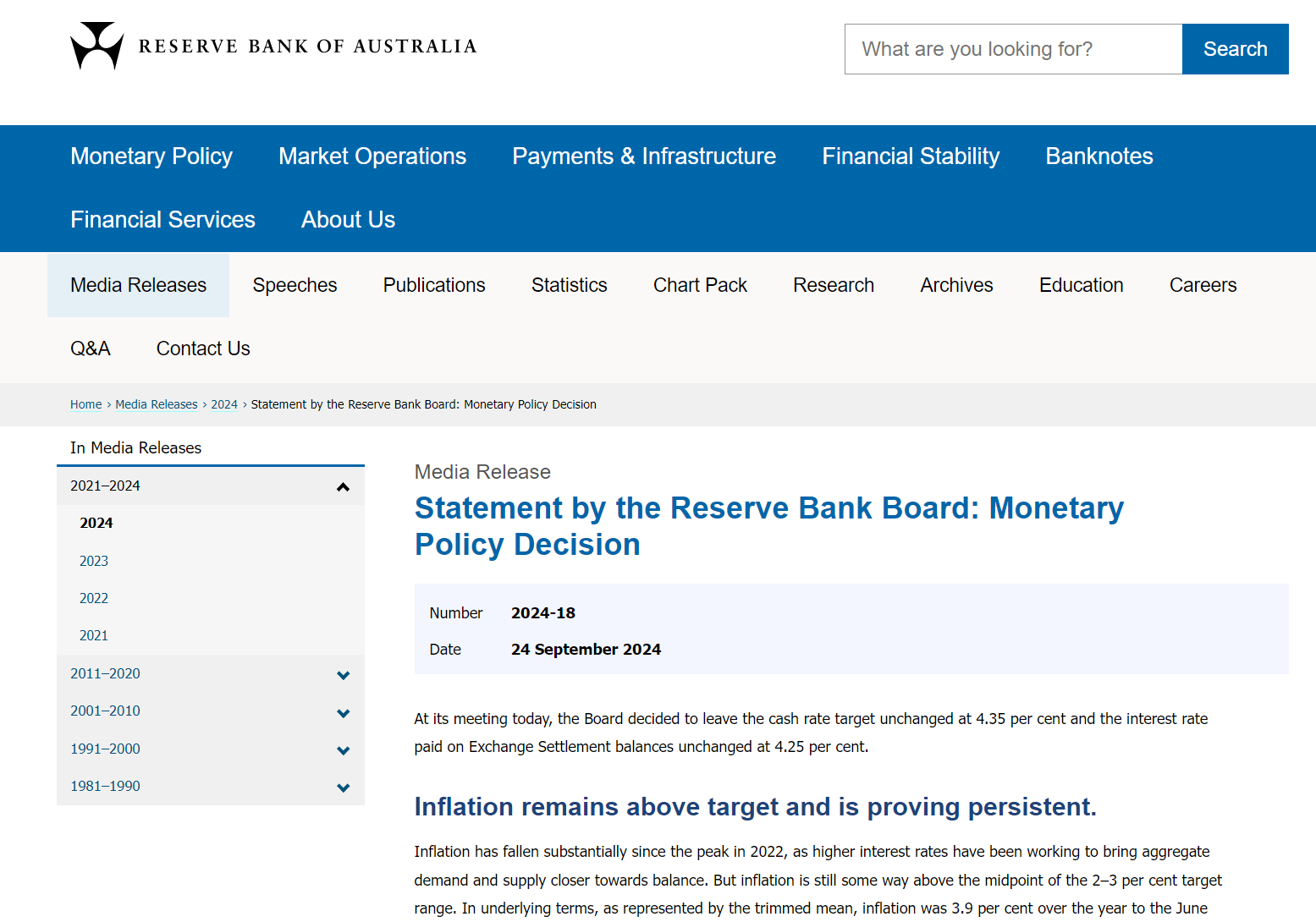RBA Holds Steady As Expected, Market Lowers December Rate Cut Expectations
On Tuesday, the Reserve Bank of Australia (RBA) continued to leave its cash rate target unchanged at 4.35%, in line with market expectations.
On Tuesday, the Reserve Bank of Australia (RBA) continued to leave its cash rate target unchanged at 4.35%, in line with market expectations. Notably, this is the sixth consecutive time the central bank has kept the rate at 4.35%.

Currently, a number of central banks around the world have followed the Federal Reserve to open a rate-cutting cycle, the Australian Federal Reserve is a rare central bank that still maintains a hawkish stance.
In a statement released, the Australian Fed emphasized that inflation remains above target and sustainable. “Our current forecasts suggest that inflation will not return to target levels on a sustained basis until 2026. On a year-end basis, underlying inflation has been above the target midpoint for 11 consecutive quarters and has barely declined over the past year.”
The statement mentioned that getting inflation back to the target level on a sustained basis within a reasonable timeframe remains a top priority for the board. This is because “this is consistent with the RBA's mission to achieve price stability and full employment. Longer-term inflation expectations have so far been consistent with the inflation target and it is important to maintain this.”
The RBA said that while headline inflation will decline for some time, underlying inflation is a better reflection of inflationary momentum and remains too high for the time being. And it emphasized that “policy needs to be sufficiently tight until the Board is convinced that inflation is moving consistently towards the target range.”
The message from the Australian Federal Reserve was clear - the market still won't see the central bank cutting rates anytime soon.
The tough stance pushed the Aussie dollar up 0.4 percent to $0.6864 against the U.S. dollar, its highest level since December last year and close to its then-high of 0.6871, while the policy-sensitive three-year government bond erased earlier losses and was essentially flat at 3.55 percent.
Investors are now awaiting monthly inflation data for August, due on Wednesday. Markets are widely forecasting that Australia's consumer price index (CPI) will fall below 3% in August for the first time since August 2021, thanks to government measures such as energy subsidies.
Last month, data released by the Australian Bureau of Statistics showed that the CPI came in at a rise of 3.5% in July, down from 3.8% in June and slightly above market expectations of 3.4%.
The market is widely believed that the year-on-year fall in inflation was largely driven by the government's energy subsidy policy, which has also come under some criticism.
Harry Murphy Cruise, an economist at Moody's Analytics, said: “July's inflation data was full of blinders. On the surface, the fight against inflation appears to have made great progress, but part of the improvement comes from rebates that artificially lower the cost of electricity. While this made the headline inflation figures look much better, prices ultimately did not change.” However, the government has denied claims that its policies have contributed to the price rises.
Markets now put the likelihood of an Australian Federal Reserve rate cut in December at 59%, down from 64% before the resolution was announced. Economists, for their part, generally expect the Australian Fed's rate-cutting cycle to not kick in until February next year.
“We continue to see rates remaining unchanged until the second quarter of 2025.” Sean Langcake, head of macroeconomic forecasting at Oxford Economics Australia, said, “The path of core inflation back to the target range has stalled somewhat, and it is difficult to see a significant improvement in the near term.”
·Original
Disclaimer: The views in this article are from the original Creator and do not represent the views or position of Hawk Insight. The content of the article is for reference, communication and learning only, and does not constitute investment advice. If it involves copyright issues, please contact us for deletion.